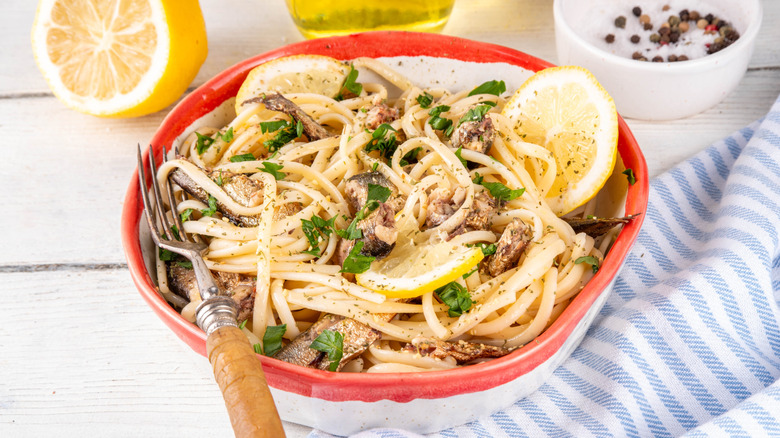The Canned Ingredient That Has More Calcium Than A Glass Of Milk
Milk is often marketed as the best source of calcium, but an even better, highly underrated source just happens to be one the best canned foods. Next time your passing the tinned seafood, make sure to pick up a few cans of sardines — these little fish pack 351 milligrams of calcium in a 3.75-ounce can, translating to 35% of the recommended daily value of 1,000 milligrams for adults ages 19 to 70 years old and children 4 to 8 years old, or 27% recommended daily value of 1,300 milligrams for children and teens 9 to 18 years old. Milk, regardless of the fat content, contains 300 milligrams of calcium per cup.
Sardines are not only an excellent source of calcium for individuals who don't drink milk, but they're also beneficial for those who do regularly drink milk, as the majority of the U.S. population, including children, fail to meet the recommended daily calcium intake. Calcium is crucial for bone health, but it's also essential for proper muscle and nerve functioning, hormone regulation, and potentially offers a defense against colorectal cancer and kidney stones.
Sardines haven't had the greatest PR team throughout the years like milk has. However, sardines are ready for their moment to shine. They're ready-to-eat, affordably priced, widely accessible, and their salty, umami flavor along with their hearty texture make them easy to add a kick of calcium to just about any snack or meal.
Small fish with big nutritional benefits and big flavor
Many canned sardines are available either packed in spring water, sauce, seasoned, or in extra virgin olive oil. These options make them convenient for eating straight from the can or adding to salads or crackers for a quick, protein-packed lunch. I basically live off of sardines while in college, with my go-to preparation being topped on avocado toast, with a few slices of tomato, and a generous squeeze of fresh lemon juice. For a kid-friendly meal, sardines in extra virgin olive oil can be mashed lightly and tossed with buttered pasta and parmesan cheese. Sardines in olive oil also can replace any protein source in creamy salads, like tuna, chicken, or egg salad. Or create "seacuterie" boards featuring sardines.
When grocery shopping for sardines, ensure that the nutritional label prominently displays a substantial amount of calcium. Some brands may list lower calcium content if the sardines are boneless and skinless. It's advisable to steer clear of these varieties, as the bones within sardines are the primary source of their rich calcium content, which softens during canning and becomes edible. Aside from being a great source of calcium, sardines are also high in vitamin D, which helps the body efficiently absorb the sardine's calcium content among other health benefits. Additionally, sardines are renowned for their exceptional anti-inflammatory omega-3 fatty acid content, high levels of iron and selenium, and sardines have the lowest mercury levels.

